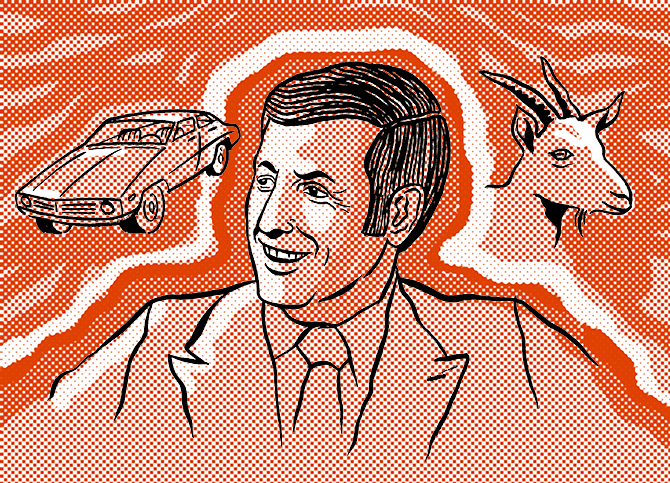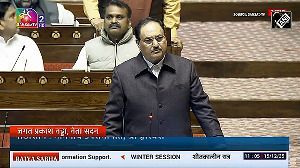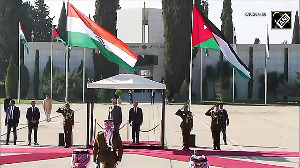'These problems teach us to think and assess information in a rational way.'
'That's all important at a time when a minister for education crudely humiliates a schoolteacher for giving the right answers,' says Devangshu Datta.
Illustration: Dominic Xavier/Rediff.com

Game show host Monty Hall (1921 to 2017) died on September 30. Recreational mathematicians will mourn his passage for he devised a most intriguing problem in his 1960s show, Let's Make a Deal. Here's how it went.
A contestant stands in front of three closed doors. Behind one is a new car. The other two doors hide live goats (really!).
The player is invited to pick a door and receive whatever is hidden behind it. (If you're vegetarian and/or anti-personal vehicle, you may think of this in terms of three locked boxes, one of which contains a large cheque and other two nothing.)
The player picks a door, which remains closed for the moment. The game show host then opens one of the other two doors, revealing a goat.
He offers the player a chance to change the original pick.
Should the player stand pat or change? It's important to remember the host knows which door conceals what.
It's a purely mathematical problem and it can be stated very simply (as above). But it's twisted enough to have fooled no less than Paul Erdos.
The answer is that the switch will double the chances of winning a car.
Here's why. On the first pick, the player has a one-third chance of getting it right and 0.33 is the probability of winning if he stands pat.
Suppose the player gets the first pick wrong as he or she will two-thirds (or 0.67) of the time.
The host then has a restricted choice. The player has picked a goat. The host must willy-nilly open the door concealing the other goat.
In all such cases, switching choice wins the car. To put it another way, standing pat has one-third chance of winning, while switching will win every time, or two-thirds in total, if the first pick is wrong!
Of course, if the host doesn't know where the car is, the problem changes.
Then, the first pick has a one-third chance of being right; the host has a one-in-two (0.5) chance of revealing the car.
Assuming the host doesn't reveal the car, the probabilities of winning by standing pat/switching remain the same.
Where most people make an error is in not factoring in the extra information available to the host and understanding the implications of restricted choice.
Bridge players are known to have raging arguments about situations of restricted choice.
It is often necessary to locate two contiguously ranked cards in the same suit, such as, say, the Queen and Jack of Spades.
Somebody drops the Queen. Does that player also have the Jack? Restricted choice suggests he doesn't. If he did, he may have dropped the Jack instead.
A nasty variation is the 'Three Prisoners Problem'.
Three guys on Death Row learn one of them has been pardoned, but not which one. The prison warden knows of course.
Being a mathematically-inclined sadist, he tells Prisoner A that he won't reveal who is to be pardoned but Prisoner B is to be executed.
Prisoner A now feels a small sliver of hope. He tells Prisoner C the news when they're in the exercise yard and C, a more mathematically aware murderer, feels a much greater surge of hope.
Why?
Replace goats with 'execution' and car with 'pardon' and it's the same problem.
A only has a one in three chance of being pardoned. If he's the lucky one, the warden could randomly choose to tell A that either B or C is to be executed.
But if A is being executed, as will be the case two-thirds of the time, the warden has a restricted choice: He can only reveal that B is to be executed.
Hence the chances of C being the lucky one have now improved to two out of three.
These problems teach us to think and assess information in a rational way. That's all important at a time when a minister for education crudely humiliates a schoolteacher for giving the right answers, and obscurantist bigots are rewriting the history books and denying the polluting effect of fireworks.











